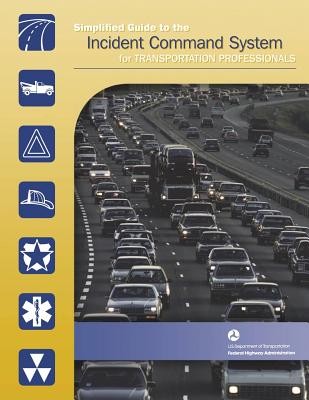
- We will send in 10–14 business days.
- Author: Federal Highway Administration
- Publisher: CreateSpace Independent Publishing Platform
- Year: 2015
- Pages: 64
- ISBN-10: 1508569142
- ISBN-13: 9781508569145
- Format: 21.6 x 28 x 0.3 cm, softcover
- Language: English
- SAVE -10% with code: EXTRA
Simplified Guide to the Incident Command System for Transportation Professionals (e-book) (used book) | bookbook.eu
Reviews
Description
Reducing traffic congestion and improving roadway safety are high priorities for the Federal Highway Administration (FHWA). Traffic incidents are a major source of both highway congestion and safety problems. Incidents are estimated to cause approximately half of all traffic delay. Crashes that result from other incidents account for approximately 16 percent of all crashes and cause 18 percent of freeway deaths. For these reasons, FHWA strongly endorses the establishment and use of good traffic incident management. Effective transportation system management and operations depends on the aggressive management of temporary disruptions (caused by traffic incidents, work zones, weather, special events, etc.) in order to reduce the consequences of these disruptions and return the system to "full capacity." The Incident Command System (ICS) is the systematic tool for the command, control, and coordination of an emergency response. ICS allows agencies to work together using common terminology and operating procedures for controlling personnel, facilities, equipment, and communications at an incident scene. The purpose of this Simplified Guide is to introduce the ICS to stakeholders who may be called upon to provide specific expertise, assistance, or material during highway incidents but who may be largely unfamiliar with ICS organization and operations. These stakeholders include transportation agencies and companies involved in towing and recovery, as well as elected officials and government agency managers at all levels. This document may also be beneficial to public safety professionals, who are familiar with ICS but may not fully understand how ICS concepts are applicable to transportation agencies.
EXTRA 10 % discount with code: EXTRA
The promotion ends in 19d.21:23:18
The discount code is valid when purchasing from 10 €. Discounts do not stack.
- Author: Federal Highway Administration
- Publisher: CreateSpace Independent Publishing Platform
- Year: 2015
- Pages: 64
- ISBN-10: 1508569142
- ISBN-13: 9781508569145
- Format: 21.6 x 28 x 0.3 cm, softcover
- Language: English English
Reducing traffic congestion and improving roadway safety are high priorities for the Federal Highway Administration (FHWA). Traffic incidents are a major source of both highway congestion and safety problems. Incidents are estimated to cause approximately half of all traffic delay. Crashes that result from other incidents account for approximately 16 percent of all crashes and cause 18 percent of freeway deaths. For these reasons, FHWA strongly endorses the establishment and use of good traffic incident management. Effective transportation system management and operations depends on the aggressive management of temporary disruptions (caused by traffic incidents, work zones, weather, special events, etc.) in order to reduce the consequences of these disruptions and return the system to "full capacity." The Incident Command System (ICS) is the systematic tool for the command, control, and coordination of an emergency response. ICS allows agencies to work together using common terminology and operating procedures for controlling personnel, facilities, equipment, and communications at an incident scene. The purpose of this Simplified Guide is to introduce the ICS to stakeholders who may be called upon to provide specific expertise, assistance, or material during highway incidents but who may be largely unfamiliar with ICS organization and operations. These stakeholders include transportation agencies and companies involved in towing and recovery, as well as elected officials and government agency managers at all levels. This document may also be beneficial to public safety professionals, who are familiar with ICS but may not fully understand how ICS concepts are applicable to transportation agencies.


Reviews